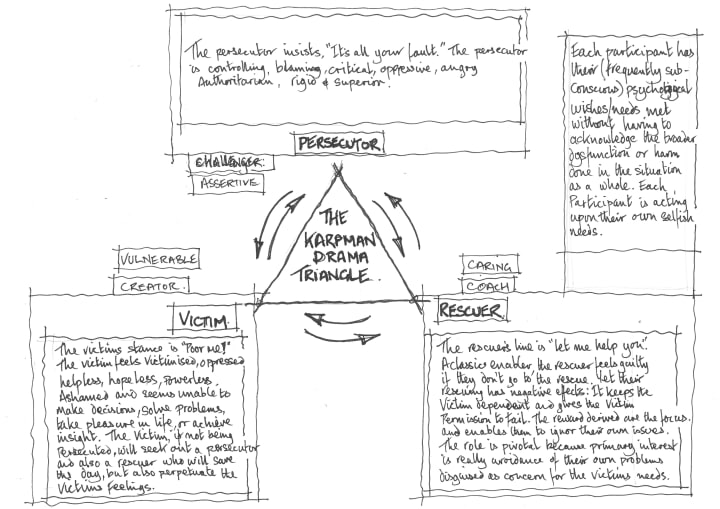Hot Gossip
The Toxic nature of gossip and why we often don’t say things directly.

The Toxic nature of gossip and why we often don’t say things directly.
References:
· Dethmer, Chapman, and Warner Klemp
· Steven Pinker – Harvard lecture
· Joe Mull - Tedx
Once, when observing my children in a play situation, I noticed that they would fall in and out of alliances and inclusion of other children, and often the preferred method for achieving this was to gossip about another child that they did not want to include in their play. By gossiping about the outsider child, they would enforce their own validity, create the enemy, and gain alliance from their “insider” friends. Kids can be very cruel. Social media exploded the possibility for toxic gossip, partly because it is entertaining and indirect and can be anonymous, but also because gossip is a tool that we use to manipulate situations and relationships without the risk (so we think) of direct conflict.
Gossip is part of our culture. It has fuelled tabloid newspapers, TV shows, and tell-all books and has found itself in many company cultures. The problem is that gossip, more often than not, tends to be negative. It’s a way of talking about someone who isn’t present and to whom you wouldn’t speak to in the same way if they were directly in front of you.
There are many ways to define gossip; for my purposes here, gossip is:
- Any statement about another person made by someone with negative intent.
- Any statement about another that the speaker would be unwilling to share in exactly the same way if that person were in the same room.
People who gossip in this way are often attempting to validate themselves and the righteousness of their thinking.
It’s not just the gossipers who are responsible, but also the listeners. By accepting to listen to gossip they are complicit in the propagation of this form of indirectness. Gossiping is often taken as a key indicator of organizational culture and is one of the fastest ways to crush creativity. It diverts energy from productivity and can create toxic environments.

Like all behaviors, gossiping tends to motivate because we see perceived benefits and a reduction of risk, especially emotional risk. We do this unconsciously, because of the way certain cognitive biases work in our brains. Some of the reasons and benefits we perceive are:
TO MAKE OTHERS WRONG.
Most of our working relationships are hierarchical. We may have someone above us (in control) and someone below us (in less control). We see these relationships as either less than me or more than me. Gossip enables us to engage in one-upmanship, which relieves us of feeling inferior.
TO GAIN VALIDATION.
Our egos understand the world as either right or wrong. Gossip allows us to validate our righteous perspective and avoid being wrong.
TO CONTROL OTHERS.
Gossiping allows us to communicate and manipulate our judgments to others. We control the flow of information in order to influence the behavior of others.
TO GET ATTENTION.
In order to draw attention to ourselves, we may reveal a private story about someone else, particularly where we don’t have anything meaningful to share with others about ourselves. Gossiping can also be used to gain status or positive attention, as the gossiper is often seen as powerful and in possession of knowledge and seemingly willing to say things that others may not be as fearless to say.
TO DIVERT ATTENTION.
If we are vulnerable, we use gossip to divert attention away from ourselves and onto someone else. Kids will often use this tactic to push attention and blame away from themselves and onto someone else. This may not even need to be directly related to the incident. Dethmer, Chapman, and Warner Klemp refer to celebrity gossip which diverts attention away from what may not be working in our own lives.
TO AVOID CONFLICT.
Gossip is a way to avoid direct conflict with someone. When we are concerned that our opinions or preferences may upset someone, we will communicate them to other people in order to avoid direct contact and avoid emotional stress. This holds true for relationships outside of organizations too.
TO AVOID FEELINGS AND/OR EXPRESSING AUTHENTIC EMOTIONS.
In most organizations, emotions are not viewed as valuable in business. As a result, it is very difficult to express any emotions directly to the person who may be causing the emotion. Thus, we use gossip to unburden ourselves of these emotions by expressing them to others who are either not involved or feel similarly.
TO CREATE (PSEUDO) ALLIANCES.
By sharing our feelings, we often create alliances of like-minded people. However, according to D, C & WK shared victimhood compromises the well-being of the individuals and the effectiveness of the team.

THE DRAMA TRIANGLE.
Developed in the 1960s by Stephen Karpman, the drama triangle describes this sort of gossip behavior.
Imagine that Janet and Paul are working together in a large corporation. Janet gets upset by something Paul has said. She doesn’t (normally) go to Paul to say, “something you said has upset me, let’s talk about this like adults…” No. she goes to another friend, Richard, a co-worker and confidant, and says; “I’ve seen four customers today and Paul has only seen two. I don’t know what his problem is, but I’m done with him!” to which Richard replies; “I know. That’s what happened to me last week.” And they have formed a little “drama Triangle.”
This happens everywhere and in every situation. If you argue with your mother, you don’t call your mother, you call your sister to complain. This is a predictable pattern of behavior and each role has a name.
Janet is called the victim. She sees herself as being wronged by Paul. Richard is called the rescuer, that’s how he sees himself. Janet needs me. Whereas Paul is the persecutor. Janet goes to Richard because it’s easier, it’s less conflict and more comfort. It gives her the comfort of validation and avoids the discomfort of confrontation.

One of the reasons we often fall into this pattern of behavior is that our brains are hardwired with various biases and assumptive thinking that lead us down this path.
ILLUSORY SUPERIORITY BIAS.
If someone is late for work, we might think, they are always late and they obviously don’t care about their work as much as I do. We will assume that they don’t have a good reason to be late. Our views of the late person will normally be negative and we attribute character flaws to them, but not to us. Whereas when we are late for work, we will normally validate ourselves with good reasons why this has happened. We tend to think better of ourselves than we do of others. We rarely think of ourselves as average. We inflate our abilities and we down-play other people’s abilities. It’s almost as if we have an angel on one shoulder and a devil on the other.
FUNDAMENTAL ATTRIBUTION ERROR.
We attribute success to ourselves and failure to others. We do not see the world from another person’s perspective. More often than not, we will attribute our successes to our skills and our virtues. We overestimate our skills and abilities and we assign negative or lesser attributes to others. When we experience this type of contempt, we invite others to join us.
In politics, there is a manipulated form of gossip -the “leak.”. A government will allow the “leak” of a new policy and in this way, indirectly, test reaction to a new, possibly controversial, policy on the general public. Leaks are used to evaluate behavior and to test reactions. Rather than launch a policy directly with all the risks that involves, an indirect method is used.
This sort of indirectness has been purposefully used for centuries in diplomatic relations. It’s far easier to allude to something indirectly, perhaps with a greater degree of politeness, than to say it directly. Then, if it isn’t well-received, you can withdraw the statement, which allows plausible deniability (more about indirectness next week).
Gossip is a form of indirectness. Indirectness allows us to say things indirectly that we wouldn’t want to say directly. Gossip serves this function but can become toxic and viral. Rather than confronting the source of discomfort, we “off-load” to another, less contentious and less risky person in whom we can find an alliance and the possibility of manipulating their behavior.
While confronting issues directly can be uncomfortable, it can result in resolution of the issue. Gossip rarely results in resolution; it almost always causes pain and humiliation for the person it is about, and problems for the other two players in the triangle.






Comments
There are no comments for this story
Be the first to respond and start the conversation.